|
| 2017 | JAN | FEB | MAR | APR | MAY | JUNE | JULY | AUG | SEP | OCT | NOV | DEC |
| 2018 | JAN | FEB | MAR | APR | MAY | JUNE | JULY | AUG | SEP | OCT | NOV | DEC |
| 2019 | JAN | FEB | MAR | APR | MAY | JUNE | JULY | AUG | SEP | OCT | NOV | DEC |
| 2020 | JAN | FEB | MAR | APR | MAY | JUNE | JULY | AUG | SEP | OCT | NOV | DEC |
| 2021 | JAN | FEB | MAR | APR | MAY | JUNE | JULY | AUG | SEP | OCT | NOV | DEC |
| 2022 | JAN | FEB | MAR | APR | MAY | JUNE | JULY | AUG | SEP | OCT | NOV | DEC |
| 2023 | JAN | FEB | MAR | APR | MAY | JUNE | JULY | AUG | SEP | OCT | NOV | DEC |
| 2024 | JAN | FEB | MAR | APR | MAY | JUNE | JULY | AUG | SEP | OCT | NOV | DEC |
| 2025 | JAN | FEB | MAR | APR | MAY | JUNE | JULY | AUG | SEP | OCT | NOV | DEC |
![]() Read current month's Daily Reflections
Read current month's Daily Reflections
![]() Table of Contents: Daily Reflections
Table of Contents: Daily Reflections
![]() Youtube Channel: Video Listing
Youtube Channel: Video Listing

(*photo credit)
January Reflections, 2025
In the icy days of winter we discover nature's hidden life breaking through the stillness of this snowy season. Nevertheless, creeks, rivers and springs give sound to January. Gurgling living water becomes nature's seasonal music proclaiming the hidden changes that occur. In January we reflect on the gift of our Baptism that is so related to planetary life. Through water we are saved, and so we are called to help save the water. We tackle water pollution problems and realize that millions lack a plentiful supply of high quality drinking water. Some must buy water from privatized water supplies thus denying a water commons. Let's promote free potable quality water for all.
Queen Anne's Lace
A fitting regal name to remember,
delicate when in summer bloom,
and standing tall amid floral finery.
It's winter and still standing erect,
braving now the frigid clime,
with a snowy crown so very fitting.
The Year Ahead
My resolutions for 2025 should be no surprise for regular readers, since these have been mentioned on numerous occasions for the past two years. The emphasis is on national ones, though personal ones even at 90+ are still pertinent. Certainly these issues have a gradation though succeeding in one or other enhances all progressive prospects. High hopes rest with a backlash to the new congress now being sworn into office, and our efforts are expected to compensate for what the White House lacks.
Join the Climate Change Agreement. The year 2025 is critical for helping to save our threatened planet. Encouragement, not denial, is key to sustaining the 200 members of the community of nations who are now needing to take very positive steps to keep from exceeding the 1.5 degree Celsius rise that appears on course. Action can avert disaster. From a planetary and environmental standpoint this is THE issue and a failure to confront our absence as the only nation in the world from the Paris Climate Change Accord is an ongoing Crime Against Humanity. That crime would cease the moment the U.S. becomes an equal partner in this quest for sanity in this climate-changing world.
Divest from Big Energy Corporations. An associated climate change problem deals with reluctance to confront Big Energy, the merchants of doubt who are more worried about profitability than saving a fragile Earth. During the last year we focused on the democracy-damaging problem of vast inequality. We did not doubt the power and influence of billionaires in this globalized economy and tolerance for their privatizing the wealth of the Commons. These privileged few have the ear of a socially deaf Administration that still subsidizes an outmoded fossil fuel and nuclear industry while omitting the saving power of renewable energy sources.
Apollo-type Renewable Energy Effort. The time is at hand to favor renewable energy sources that have now proved to be environmentally safe and already more economically viable than the fossil fuels and nuclear powerplants. The current national energy policy is unreasonable given the global climate change crisis at hand. The new Congress must hasten a renewable energy project similar to the World War II Manhattan Project (atomic bomb development) and the Apollo Space Program in the 1960s. The world needs more renewables to meet growing energy demand and our country needs them to replace the closer of unsustainable power facilities. It's doubly crucial with the advent of electric plug-in vehicles.
Fair Taxes. How do we pay for such an expanded safe energy program? Easy enough, if we raise taxes on the high earners and do so to the degree that FDR put taxes on the wealthy during the critical days of World War II (94%); our economy prospered then and could in this equally critical time through truly fair taxes especially targeting the billionaires and multi-millionaires. A fair tax could also yield monetary surpluses that would stop the calloused expansion of indebtedness by a trillion or more a year even in good economic times.
Upping Minimum Wage. Families require more than the Federal $7.25 minimum wage to stay alive and pay for essentials and they need it ASAP. This raising of lower limits has not changed for decades and is a priority in Ralph Nader's recent book To the Ramparts. Had the rate been keeping with inflation it would stand at about $11 right now; some progressive local and state governments have already taken the initiative up to $15/hour. The lower income people fulfill a critical component of our economy, and will rapidly spend wage gains for the benefit of the consumer economy. Why must they sacrifice so CEOs can bask in their billions? Why should corporations pay low wages and direct struggling employees to food stamps at the public expense?
Health Care for All. A rapidly emerging issue for millions deals with high and even bankrupting medical and drug costs. Why not have reasonable cost like more advanced nations? The day of privileged health care is over; healthy accessibility is a right of all people. Why all the high-salaried medical insurance CEOs when a governmental program could prove efficient and economical?
Cut Military Expenditures. An inflated defense budget only benefits the military industrial complex. We are not at war, or are we willing to engage where we could act diplomatically rather than militarily? Why thousand dollar hand tools and wastes? We have no need of more vulnerable multi-billion dollar aircraft carriers or state of the art hundred million dollar fighters groups. Stop extravagance and transfer financial savings for the Common Good of all people. Why those worldwide military bases?
Let's Visit the Neglected. This is as much a local as a national and global issue. Too many of our neighbors are isolated and in need of companionship and occasional care and visits. You and I ought to give time for what we can do either physical contact, letter, email or through social media. From an individual standpoint we can make a difference and improve the quality of life for the ill and shut-ins.
Double Our Civic Efforts. The year 2025 is a critical time for our nation, because the demand is for genuine civic participation to truly make this nation great again. There has been too much banter about "nationalism;" it is more than biases to some party, race or cultural group. The programs just listed and needing fostering are for all the people and not the privileged elite. To achieve positive results requires redoubling of our efforts at conversation, emailing, phone calls, letter-writing, petitioning and true participation in government at every level. We cannot leave this to a few activist souls; all citizens must participate to the degree energy and time allow.

A home-made suet cake provides a tasty winter meal.
(*photo by Sally Ramsdell)
January 1, 2025 Launch 2025 with Fresh Beginnings
They shall beat their swords into plowshares and
their spears into pruning hooks. (Isaiah 2:4)
We all crave new beginnings and that is why new calendars mean so much to us. We start again; we always hope that this year will be filled with better news; we desire that struggles in the Middle East will be resolved; we pray that true peace will arrive this year -- and that our hopes and dreams will be fulfilled.
Let us be people of compassion. On this beginning day of 2025 peace is the shared dream of billions of people who are afraid of what is to come. Franz Schubert's "Messenger of Love" turns us to our distant brothers and sisters in far off lands who last night dreamed of a new year that could bring them decent homes, full bellies, and peace and security in their land. What humble dreams! The realistic craving of these people is shared with all people of good will. A form of radical sharing is just that, an extending of simple dreams to all in the human family. In its own way this is a foundation for a global movement that is a form of profound sharing. Is it unrealistic to hope that we shall all work together to beat swords into plowshares?
New Year's Day should consist of several components: a formal prayer that 2025 will be meaningful for all; a time of rest and pause from the busy load we often carry; and a resolution to reflect on how we intend to improve in 2025. A few remarks about these three elements: first, how about praying with others? We need to see that our efforts this year will be collaborative, for we cannot do it all alone, so joint prayer is important. Second, how about making our restful day complete by relaxing in a different format (a new book, an extra walk, a phone call) instead of following the usual ritual? However, we may not be able to change the football watchers, so don't pester them; at least get them to try a more healthy snack. Third, let us make a single resolution (multiple ones are too burdensome and more prone to failure). Hopefully, many of us will resolve to conserve resources and help the world move to a renewable energy economy.
We may resolve to start afresh with each new day, with the rise of the sun and the first regular morning exercise. Starting afresh with the New Year is somewhat more dramatic. This year's monthly listing of "Daily Reflections" will be accompanied by seasonal YouTube videos with environmentally related subjects.
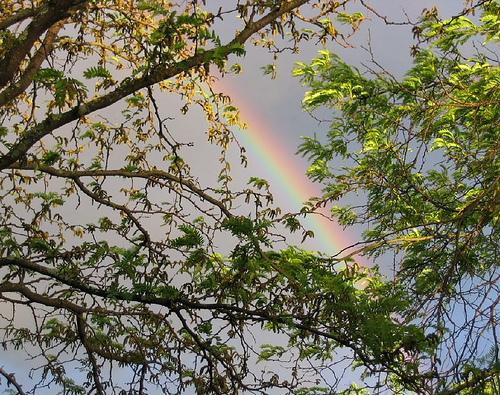
A rainbow from a warmer season.
(*photo credit)
January 2, 2025 My Ten Favorite Scripture Passages
I would like to share with you my ten favorite passages:
1. The rainbow is the sign of hope for us all.
Here is the sign of the Covenant I make between you and every living creature with you for all generations: I set my bow in the clouds and it shall be a sign of the Covenant between me and the earth. (Genesis 9: 12-13)
2. The practice of being unfair in use of resources is often overlooked by the one doing it, and we have to be reminded.
When there came a traveler to stay, the rich man refused to take one of his own flock or herd to provide for the wayfarer who had come to him. Instead he took the poor man's lamb and prepared it for his guest. (II Samuel 12:4)
3. This motto makes us use our allotted time wisely.
Teach me to count how few days we have and so gain wisdom of heart. (Psalm 90:12)
4. We hear the prophet giving a caution that we must tell to a world of concentrating wealth.
Woe to those who add house to house and join field to field until everywhere belongs to them and they are the sole inhabitants of the land. (Isaiah 4:8)
5. We need to keep in mind the time for doing certain things.
There is a season for everything, a time for every occupation under heaven.... (Ecclesiastes 3:1-8)
6. This passage shows God's blessing to those who seek to live a good life of struggle. Blessed are the poor in spirit.... (Matthew 5:3-10)
7. This is the promise that the lowly will rise.
My soul proclaims the greatness of the Lord and my spirit exalts in God my savior; ... (Luke 2:46-55)
8. This gives the heart of the message of our nourishment during the important work that we must perform.
This is the bread come down from heaven... (John 6:58)
9. A model of how the Global Commonwealth should be seen.
The faithful all lived together and owned everything in common; they sold their goods and possessions and shared out the proceeds among themselves according to what each one needed.
(Acts 2:44-45)
10. The demand to work in the public interest is given.
Always consider the other person to be better than yourself, so that nobody thinks of his own interests first but everybody thinks of other people's interests instead. (Philippians 2: 3-4)

Red-spotted newt, Notophthalmus v. viridescens. Harlan Co., KY.
(*photo credit)
January 3, 2025 Resolve to Keep a Day Book
Record keepers are compulsive organizers and realize that sometimes the records will become most handy to verify a demand placed on our fading memory. If a resolution has not yet been made, then keeping a record of all work and contacts along with climate and other happenings can be beneficial for one's ongoing history. This gives importance to our daily works. My great uncle, Louis Burke, a master gardener, kept standard red record books for sixty years; these are now regarded by his descendants as of immense value. I was able to read one and it proved to be a window into his very full and active life.
A "day book" does not have to be a diary, which involves the thoughts and feelings of a given day, though these can be quite important for the introspective person. Diaries are important for those who seek to grow spiritually in a methodical fashion -- and the record may also be of interest to a chance reader later after the writer passes. Rather, my preference is for the "day book," a record of all the significant happenings. Note: Day books are not meant for everyone, for some may find recording as burdensome or overly disciplined. The secret is not getting behind with the writing but to have a set recording time. We certainly cannot remember numbers from day to day and so the records of the "day book" are for those of us with short memories. I do consult past records numerous times and find this beneficial.
I keep the following information in my current day book:
* major assignments of the day (talks, work on writings, editing corrections, major travel record with miles, meetings attended, funerals, marriages, garden planting and major harvests, and time and place of liturgies);
* approximate time at each assignment and the number of hours expended along with the total hours of work each day;
* crossed out planned assignments that did not occur, for this could prove important in future contacts;
* intention for whom day and liturgy are offered;
* weather conditions, major storms and temperature ranges;
* letters sent to named individuals;
* e-mails sent or responded to;
* phone calls to, from and for people;
* marketing activities that include the prices paid for groceries, supplies and other items along with mail purchases;
* sacraments administered;
* Major literature or book completed that day;
* the strokes I make on my rowing machine; and
* major reflections or change of direction in life (rare except during annual retreat, which I record in the day book).
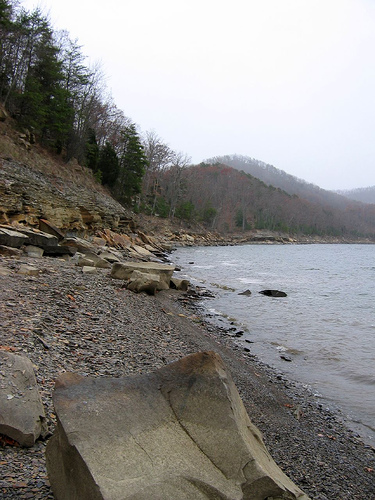
Snow flurries near Cave Run Lake, KY.
(*photo credit)
January 4, 2025 Our Rock of Refuge
A rock is a symbol of security; it does not normally crumble or erode very quickly. A photo of Little Devil's Den at Gettysburg taken in 1863 shows a dead soldier and a boulder with the same cracks and indentations as the one we can see first hand almost 154 years later. We know that granite rocks turn to soil with time; but that is after a long time period. For all intents and purposes such rocks are considered stable, secure, firm, and unmoved. Thus God as our security is seen as "rock of the ages," our anchor, our stepping stone, our point of refuge, and our base of operation.
Jesus tells us to build a house on the rock and not on an insecure sandy foundation. What is interesting is that we see God as our rock; we need to build of this divine rock for ultimate security. God is our constant companion and the two of us stay together: God working with us and we working with God. We have to build a household that is secure. Our parents were once called by God to build such a home and act as rock foundation so that we might find stability during our youthful period of life. Single parents are challenged to perform the task alone; pray that they can do so. In cases of death of parents a third group or the children themselves must construct such a house, a rock of refuge.
An African missionary tells about an impressive team of home-makers in South Africa on a continent currently with millions of orphans. Twin orphans, Daniel and Danielle, were hardly in their teens and yet they were called to be head of a household on the death of their parents from AIDS. Their father died first and then their widowed mother followed, with her children promising to hold the family together. This they did with lessons taught them patiently by their sick and dying parents.
First, the twins were freed of the painful task of going long distances for firewood, which was the only source of heating water and cooking for the poor. Instead, they used solar energy by means of solar cookers to do two things: to cook their simple meals each day and to heat and purify their own local drinking water. The twins continued the family garden because their parents had taught them when to plant the root crops, which could thrive on their soil and would supplement the handouts of flour/soy mix and oil by the local relief agency. They dried leaves of certain trees and plants and ground them up and added them to the soup as a protein supplement. And all the while they prayed as single family unit to "give us this day our daily bread." Daniel and Danielle taught the missionary a valuable lesson: they could hold the family together through selfless work and cooperation. They took turns going to school in the evening and teaching the three younger ones at home school periods doing the day. They were an exceptional little family and true models in a world of need.

Mourning dove, Zenaida macroura.
(*photo credit)
January 5, 2025 Truly Living the Epiphany
Let the mountains and hills bring a message
of peace for the people. (Psalm 72:3)
In America we transfer the feast of Epiphany ("Little Christmas") to a nearby Sunday. Yes, it is long after the December 25th feast but we can concentrate on the spiritual meaning of this event, namely, the presentation of Christ as Good News to an awaiting world. Just as the Matthew account tells how the wise men brought precious gifts to place at the feet of the newborn, so we present to others the newness of Christ to uplift their lives. We are meant to be the wise bearers of this age.
Our journey is not limited, but takes us via modern communications to suffering people in the farthest reaches of the globe. In an instant we can reach the other inhabited continents with messages of hope. With each passing year the access to these reaches become easier, and so our minds are challenged to do this with facility and care.
We each bring our own precious gifts to the altar of God and, though small in amount, we bring them with a generous heart. We travel lightly on this Earth, for we are born naked and will die with nothing to carry away but our love and open heart. Like the little drummer boy of Christmas fame, we give with a loving selfless heart the little we have without pretensions or materialistic ambitions. We seek to touch our wounded Earth, and this hope is what we bring with all our heart to help where needed. Our gift becomes a glue to unite a global family.
To take a journey of faith is what it is, namely, a journey and not a trip, a tour, an excursion, a hike, a sight-seeing venture, a travel bout, or an aimless movement about. Our journey means a day's work "Diurnata" from the Latin "diurnum" or daily portion. Former journeying by our ancestors arriving at these shores involved great risk -- uncertainty of lodging, food or work opportunities. Like Magi, subject to deliberate misdirections, we can be deceived by empty promises; we must be constantly watchful.
Our goal is to take the Lord to others and others to the Lord. It is a cooperative human and divine undertaking, for we work with God's help in what we are called to do. It is the Holy Name of Jesus pronounced by those who came reverently before us, we resolve to carry on. In his Name all will conquer, but we must truly believe in the power of that word. We find "Jesu" out there in among the trees of North America on which the early martyrs carved in order to set a claim for Christianity. We find it in our hearts and the hearts of others we join in collaborative service. Our work will not be completed but it is important to begin it.

Tufts of snow from a January squall.
(*photo credit)
January 6, 2025 Discovering Retreat Time and Space
In the morning, long before dawn, he got up and left the house,
and went off to a lonely place and prayed there. (Mark 1:35)
Now is a good time to find free time to give to the Lord during our busy year. The need for such a temporal and physical space is more pressing than most of us admit. One can think of this as a personal matter apart from others, or for those who are absent from family and loved ones as space and time to be more with each other. Some of us do succeed in taking reflection time for eight days or a weekend or even a special day. Whatever the length of time, give the specific physical environment consideration.
* Is the retreat site accessible from where you live? Long distance travel to a retreat location may be the only way you can really get away but, on the other hand, some local places may be okay if your do not tell your location to those who may intrude on your time and space. The choice of space is more pressing for those who are often at the service of many. Some even like to get away from auto accessibility, and pack in the supplies by backpack to a remote place. More power to you!
* Is the place simple? The retreat house or cabin or rustic outdoor location should be inviting, clean and still quite austere or somewhat simple, although the interpretation of "somewhat simple" will vary with the needs of each retreatant. Some cannot climb steps or sleep in a loft; they need ample windows and fresh air, and may even need cooked meals provided. Some desire a motel setting while others find this plainly distracting. Some like added opportunities to fast at times and keep to their own menu and simple fare. Being as simple as possible is meaningful.
* Is it prayerful? Choose a retreat location that is relatively quiet and, if possible, also scenic. The environment lends to our ability to turn our minds and hearts to God. Under normal circumstances, people prefer external tranquility, though some with God's help can make due with a "silence of the heart." Generally, silence holds precedence over scenic view and is possible even near congested areas where sites are enhanced by vegetative, wooden or masonry noise barriers, or are protected by topography that deflects the sound. Is the place a location where one can enjoy the woods? Sunrises and/or sunsets? Wildlife?
* Is it secluded? Solitude seekers like seclusion but not isolation. If the retreat center or cabin is in a well-chosen enclosed natural space (a cove, valley, dense woods, etc.), seclusion is the major factor. Some may prefer "relative" seclusion, that is, security through cell phones, companions, pets or even security guards; often these connecting links add comfort to reflection time. An alternative is a non-secluded lodging but excursions into secluded areas during the day.

Droplets of water on rough-leaved dogwood, Cornus drummondii.
(*photo credit)
January 7, 2025 Planning Regular Health Checkups
Every time we visit the hospital or a sick friend we thank God for the gift of our health -- and we may resolve once more to do all we can to protect that gift in our lifestyle and ordinary practices. One such practice is an annual checkup (my doctor recommends two per year). Stewardship of our body involves both seeing how short our life is and realizing our responsibility to keep ourselves as healthy as possible. Care and concern require the insight to know how vulnerable we are and how dependent upon the Giver of life. Furthermore we have to face reality, and fear that a physical examination may discover something threatening.
The internal physical checkup is like a health confession -- what we did wrong or right for the last time period. The vital signs of life -- stress, skin color, good and bad cholesterol, blood pressure, and weight. As we get older the drama actually increases with each checkup. Is something amiss? We feel somewhat relieved when we are assured that no new difficulty has surfaced, or we are struck when told to get further testing in areas we never dreamed about. We have a way of denying health problems or any need for further diagnosis. With aging we learn that life is never uninteresting; we also confront the world's major concern: health care. Of course, many avoid checkups out of fear of the cost if something is found wrong; in this country health insurance is still not totally covered or even present to about one-tenth of the people. The uninsured cannot afford to confront health problems.
We speak of health checkups (in the plural) because portions are not covered by individual internal medical specialists. Do we get the annual dentistry checkups as well? Some omit the teeth checkup because many health insurance policies do not cover dental health. Do we have regular eye checkups? We do need optimum eye conditions for driving, reading, and close work. And finally do we have a checkup for skin problems?
The final suggested checkup does not require other experts but is a personal practice-review of living in which we are the expert. It is our own annual preventative health and wellness audit -- and it is free of charge. Let's hope we can answer all the following in the affirmative:
* Do I get regular exercise even on bad winter days?
* Do I take no drugs except what are prescribed and even here insist that they are really needed?
* Do I refrain from smoking? From drinking anything more than moderate amounts in company and at meals?
* Do I get proper amounts of sleep and rest?
* Am I careful about eating habits and do I eat healthy food?
* Do I drive according to the rules?
* Do I follow the advice given by the health experts visited?
Focusing Amid Diversity on Climate Issues
Congress is now assembling, somewhat overwhelmed by legislative overload. Citizens need to keep themselves and elected representatives focused on major issues. Are the Trump-worshipping GOP members adequate to meet the horrendous nationally needed effort to aggressively address climate change issues? Citizens need to prioritize our information sources: Internet, TV, cell phones or periodicals. We must learn to be selective in what we consider to occupy our limited time.
Charity? Equality issues are interrelated with environmental ones because of the sheer power and influence of climate change deniers who are making profits in the outdated fossil fuel industry -- even while a movement for divesting from that industry has over one thousand participating institutions led by religious organizations. As pressure mounts ever so slowly to change to a renewable energy economy, a correlative question arises as to who controls the purse strings that are so influential in policy making. I have argued that such should not be by the 0.1% superrich who have their biases. Astoundingly, Thomas Sowell in "The Quest for Cosmic Justice" asks the same question, but opens the possibility that the few deciders could be specific governmental bureaucrats. A pro-affluent bias can emphasize the rich people's good motivations -- but what if they are also biased and yet have complete control of immense wealth? Don't these financial resources belong to those in greatest need -- and who are decision-makers? Legal title holders? Those with essential needs?
Monitoring of governmental activity is key to address those who think that the rich are entitled to be ultimate decision makers. Due to a strange past history the Pentagon successfully argues against public accounting, perhaps through need for military secrecy; the sad result of such secrecy is taxpayer bills for thousand dollar hammers. In these critical times, monitoring that branch of government drawing $850,000,000,000 per year is long overdue. With greater transparency the people in charge must bear a legal responsibility to use taxpayer funds properly -- and this is not impossible. It will free up precious funds for infrastructural changes needed to usher in the renewable energy economy utterly necessary to control climate change.
Resources likewise must be diverted from waste to oversight, so that the funding is properly spent. This applies to legislative oversight committees to monitor military and other government money as well as to the Internal Revenue Service that has been constantly stripped of funds for expanded oversight capabilities. If the need is oversight then this is part of an ever-expanding task related to curbing global warming. A national policy is more than mere participation in international conferences and contributions to poorer nations with environmental problems; resolving planetary problems demands steps taken within our national governance priorities and active citizen participation.
Diversity can distract us, but we must admit that some diversity of policies is paramount to ultimately curbing climate change. First, there's the inequality prevalent in our culture of low taxes and tolerance of the super-rich who have such climate change denying influence on national policy; these individuals and corporations need to be subjected to strict and fair taxes. Second, there's monitoring governmental spending to focus on a "Green New Deal" type renewable energy economy involving removal of fossil fuel subsidies and benefits. Third, there's transfer of financial resources to a vast infrastructure program to cut energy waste, advance renewable energy sources and move to an electrified vehicle economy; this cannot be achieved without energy storage, grid modification and a network of electrifying charging stations. All of this is diversity still needed within a long-range focus.
Personal and social responsibility go side by side. Expecting others to do the tasks for us is certainly not a good practice in critical times. During these current weather extremes we can't expect the U.S. Forest Service to do "controlled burning" where people have stuck their homes in woodlands; this omits the responsibility that individual property holders as individuals or groups should remove combustible materials around their property. How do they expect a thatch-filled landscape to remain "safe" with weather extremes becoming more frequent? Don't expect a distant government to do the work here. Fire insurance companies are waking also.
Focusing is paramount and yet diversity emerges. This is a challenge in 2025 when the community of nations will address climate change more directly. Yes, as Jeffrey Sachs says, this neglect of the global problem by the current U.S. Administration is a "crime against humanity." Are we advocates calling for action in this important area while overlooking other issues whether related or more distant? Activism demands return to priorities, and yet we need balance and sensitivity in our ordinary lives.
Planning brings order. I asked a semi-retiree once what he was going to do that upcoming week. His response was that he hadn't thought it out yet. How strange! Is he allowing social media or commentators or opinion-makers to direct his life? Who or what dictates the bulk of his free time? Certainly he and all of us should be flexible in times of emergency. But the challenge is to control our free time, and this takes discipline that free-spirited folks find hard to undertake. Caregivers may lack any "free time" and follow the Good Spirit's promptings. However, this current discussion fits more for those free of urgent dependencies, the great majority, who do have some daily free time.
Exercises of self-discipline are required to be active citizens; in winter with less chance to go outdoors it may mean fasting or abstaining from desserts or certain snacks. At day's end it means reviewing our activities and asking the Lord's blessings and forgiveness when we have stumbled. As citizens it means seeking harmony at all levels including the global one in order to hasten the Day of the Lord. Our time is precious.

January 8, 2025 AIDS/HIV Epidemic Update
Even after thirty-five years since first AIDS landed in mid-1981, the epidemic continues with shortening the lives of about thirty-five million people. Recent control and treatment measures in the U.S. have reduced this to a secondary media issue. However, in the U.S. 1.2 million still live with HIV and 13% of these are unaware of infection. Over these years 1.9 million Americans have been infected and a little over 700,000 have died. With greater awareness only about 44,000 new cases have been diagnosed in the U.S. in 2014. Still the epidemic has disproportionate impact on minorities and gay and bisexual men. Rapid testing is more widely available, health insurance coverage has expanded to HIV testing, and treatment advances has reduced AIDS-related morbidity and mortality. Antiretroviral therapy has reduced the risk of HIV transmission; more people are living with HIV than ever before, and Americans with AIDS are living longer.
While medical progress has been made with AIDS, still sub-Saharan Africa still suffers very much at this time. In the latest statistical reports almost 25 million people in that region live with HIV or about 71% of the global total. There are an additional 1.5 million new HIV infections in a single year. With deaths decreasing in much of the world, it is surprising that 1.1 million AIDS related deaths occur in Africa each year. Southern Africa is the worst affected sub-region and is widely regarded as the epicenter of the global HIV epidemic. Swaziland has the highest HIV prevalence at 27.4%, while South Africa has the largest number of cases (5.9 million people living with HIV). With such large numbers in Africa, the feeling of contempt and abandonment continues and affects orphaned offspring, who still number about twelve million in Africa alone.
In a world of insensitivity, this epidemic calls for ongoing compassion. This call includes refraining from judging victims, to making efforts to support AIDS sufferers, to promoting generic treatment for the poor (many still go untreated), and to supporting campaigns to prevent and educate about the epidemic. AIDS is playing Russian roulette with human lives. Since body fluid contact is the normal conduit of AIDS, all the more opprobrium has been rendered to those who have transmitted or received AIDS through sexual contact or use of drug paraphernalia. Furthermore, victims are still treated like lepers of old; they are often ostracized and forced to live in almost inhuman conditions for the remainder of their shortened lives.
AIDS will not disappear soon but its effects are being reduced. However, the hopeful signs of AIDS control are not fully shared by the hardest hit portions of Africa. Even after years of generous resource sharing the inequality in health security issues is all too evident.
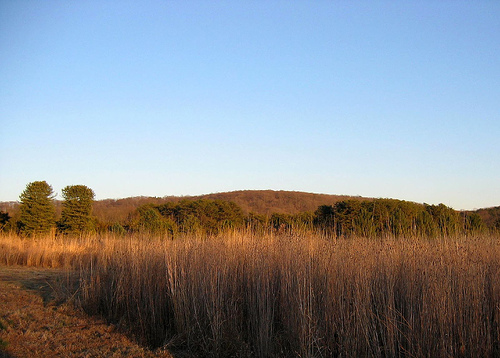
Blue skies over Bernheim Arboretum and Research Forest prairie.
(*photo credit)
January 9, 2025 Is Air Travel for the Privileged?
Should I travel by plane when it is easier to drive 500 miles, especially if the airport is 70 miles from my home? It is easier to answer than if the destination is 1,000 miles away or double that distance. When different ways of travel are optional a number of questions may include the following:
Is the trip even necessary? So much can be handled by letter, email, phone and even conference call to different places. The logistics should make it better to gather at local places and use teleconferencing instead of long distance travel of large numbers of people. All too often I travel because I think someone needs to go. Too often there is pretending involved -- pretending to work, for it takes effort to travel; pretending to be doing other than vacation; or pretending to allow others to think it is important that I or another attend. However, travel cost our Earth and our bank account. The resulting carbon dioxide adds up.
Should a delegate take the trip and report back to the rest? A local meeting of people on a given issue to choose who makes the trip should decide among participants, their ability to present and record views, and a willingness to truly represent the group.
Is air travel becoming so disconcerting that I am in a bad mood when I get there? The answer to this could be an honest "yes," and it means that I am not the ideal person to represent the others. With each passing year, I am less able to put up with the hustle and bustle of getting from transfer points, checking or carrying or storing bags on the plane, being searched and still not spilling or losing something, tolerating the food, or half running for connections, or be able to endure the fellow with the cell phone, or the one who uses your restricted air space by leaning back the seat in front, or being caught in a stalled plane for hours. Leave the plane travel to the more fitting.
Am I one of the privileged? Less than ten percent of the world's people are privileged to travel more than once by air. It is a privilege for the affluent. As the petroleum supply (70% now used for transportation) must be curtailed to keep climate change at reasonable levels, flying could become more restricted. Jetting to conferences may be a thing of the past. Question a traveler can ask are "For whom is the traveling for?" "Me or those I serve?" "Is fuel use counted against me or others?" "Why fly at all?"
Can that fuel be available in a decade or are we privileged to undertake the trip and thus deny future essential needs? Jetting is a practice that simply may not continue in the late twenty-first century unless renewable energy is plane fuel.

American chestnut, Castanea dentata, along the Natchez Trace.
(*photo credit)
January 10, 2025 The American Chestnut Arises Again
They also grew behind my house, and one large tree, which almost overshadowed it, was, when in flower, a bouquet which scented the whole neighborhood, but the squirrels and the jays got the most of its fruit; the last coming in flocks early in the morning and picking the nuts out of the burs before they fell. Henry David Thoreau, Walden, (1854).
The sad history of the terrible blight of the Castanea Americanus or "American chestnut" is told in many ways and places. My own history is that of a mighty tree that had only its massive trunk standing on our farm, for it had died just before my birth. The tree stood at the border between our place and Uncle Pete's, and though both he and my father were neat farmers, they allowed the branches of the mighty tree, now dead, to stay put as litter -- and chestnut was slow to rot. We brought a piece of the gray wood to the tobacco stripping room once and my dad said to take it back, as though we were grave robbers. The mighty tree had meant so much to them. Even my maternal grandfather spoke of getting the cows near that giant tree when he was a boy. Sadly, neither I nor any of my siblings ever took a picture of it.
In 1904, a fungus disease, Cryphonectria (formerly Endothia) parasitica, believed to have been imported on Asian chestnuts in the 1880s, reached the New York Botanical Gardens. For the next half century it slowly progressed across the eastern United States, killing millions of the region's grandest trees. Few of those American chestnuts remain though there are survivors, some only a few miles from my residence here. The Chmiels have shared their American chestnut crop with me though they have to compete with hungry squirrels. Most of the dead trees have had sprouts that died before reaching maturity.
Early efforts to develop a blight-resistant strain of pure American chestnut failed and were all but abandoned by mid-twentieth century. However researchers found a weaker form of chestnut blight fungus, which consists of a virus, which is transmitted to virulent strains under certain conditions that allows the trees to survive (hypovirulence). A second method is backcrossing American and Chinese chestnut hybrids to breed for resistant chestnuts. A third method is obtaining resistant chestnuts by transferring to them resistant genes. Several national groups work on these efforts: the American Chestnut Foundation, American Chestnut Cooperators' Foundation and the American Chestnut Regeneration Effort as well as regional groups. Interest is growing again not only in producing seedlings from the rare survivors but also in planting new stands of chestnuts (at least two trees near for cross pollination). Restoration comes as is now occurring on the ASPI property -- and now bearing fruit.

Preparing an herb bed for spring planting.
(*photo credit)
January 11, 2025 Launching the Growing Year: Hot Beds
We marvel at the ingenuity of those who came before us in how they were able to make things work. Composting is one of those areas, and the genius of earlier gardeners was that they combined the heat produced by composted materials with sprouting and growing early seedlings for the spring. These gardeners knew that greenhouses were possible, but required great care and expensive fuel to create artificial environments to grow seedlings in winter. However, they knew that the floors of animal barns, with the manure covered with fresh straw bedding, would stay reasonably warm throughout the cold winter nights. By conserving composting heat, they could sprout seeds much quicker than sun-warmed seeds.
Gardening with a hot bed perhaps has at least a thousand year practical application in the temperate zones of Europe, and the practice can even be traced to antiquity. It means putting composting manure on the sides and bottom of a bed of soil. When I was young on our family farm, we constructed the hot beds by spreading a layer of partly composted cow or horse manure about six-inches deep on bare ground and adding several inches of top soil. A series of eight-foot long two-by-twelve-inch portable wooden frames was set on the manure bed yielding contiguous four by eight-foot beds. These were banked with a plentiful supply of manure up to the level of the slightly inclined frame windows. The vegetable seed was sown in soil that was surrounded by warm composting manure. Our hot bed equipment consisted of single-pane windows, but we know that double-pane ones do a more efficient job by conserving heat at night. On sunny days the windows were placed ajar for air flow and the escape of excess moisture and heat. Some plant watering was required.
My great uncle, Louis Burke, (mentioned on January 3rd) was a highly successful gardener with a medium-sized farm operation just outside Lexington, Kentucky. He wrote on January 2, 1922 that he and his helpers made fourteen hot beds using horse manure from nearby horse farms. He certainly had a plentiful supply of manure from Lexington where it was regarded as a troublesome waste. He knew that the heat of the bed started the plants (cabbage, broccoli, sweet potatoes, tomatoes, kale and others), which would then be ready for spring planting. Gardeners who lack access to horse manure can use cow manure (though undiluted chicken manure is too hot and will burn seedling roots). Layering with insulation below the hot bed could permit the use of a thinner layer of manure. Double-pane windows will conserve more of the compost-generated heat, which is augmented by heat captured by insolation on sunny winter days. Applying straw bales near the perimeter would permit a thinner siding of composting materials as well. Overly composted materials would not generate sufficient heat. Hot-bed manure is later used as garden fertilizer.

Hollow tree provides shelter for animals in winter.
(*photo by Marge Para)
January 12, 2025 Baptism and Life-giving Water
I formed you and set you as a covenant of the people. (Isaiah 42: 1‑7)
Isaiah speaks of the Servant of Yahweh, and that voice of so long before was applied to Jesus and his public manifestation or the second Epiphany or manifestation of the Christ. Jesus is committed to a life of bringing about change in the people, upsetting an established order, announcing justice for all the people, being a light to the nations, and a liberator of captives. This is a call to abandon the old order and to take on a new one. Ignite a fire, and Jesus' baptism is the initial event.
Simon Peter comes to a realization about his own ministry as a continuation of the ministry of Jesus, now being further extended to all God‑fearing nations and peoples. God shows no partiality, for whoever fears God and acts uprightly is acceptable to the Almighty. During this month of vocation we return to our original calling, our moment of listening to God and being willing to set out on our journey of faith. Peter is called again to look more deeply into his own ways of seeing things and understanding his own service. This recalls the light of Jesus’ call to ministry, when the Spirit came down upon him in the form of a dove and the voice came from the clouds giving a divine stamp of approval. Peter speaks in the name of all of us in the Church in saying that our mission is linked to that of the profound call of Jesus Christ to begin a process of liberation of the entire world. Peter advances the liberating process, and we with all believers say "Amen."
The divine voice from heaven is one of approval, "This is my beloved Son. My favor rests on him." Jesus goes into the wilderness to be baptized by John, and thus the wilderness is the place for radical change and profound insight to bring justice to the world amid expected opposition.
Jesus prepares as priest, prophet and king for his call to public ministry. We enter the spiritual wilderness to associate ourselves with him, to be led by the Spirit; we pray to obtain insight into what we are to do as we face a threatened planet and an Earth riddled through with injustice and division into haves and the have-nots. Our brothers and sisters must be treated with kindness; they need proper pay, necessary health benefits, accessible schooling. Prisoners need to be liberated, terror to be replaced by hope, and all to have adequate food and decent housing. This means we live our baptismal mandate to effect reestablishment of the commons where all share in the resources of this world as equals. This will not be obtained by miracle; we are the ones called to bring about liberation.

Exploring the forest floor in winter.
(*photo credit)
January 13, 2025 Consider Soups in Winter
Thoughts in January may turn to soup for good reasons:
Soup is warm and welcoming -- Granted, cold soups are for helping us endure summer's heat, but it is the steaming soups on cold winter days that perfectly hit the mark, as winter hikers and outdoor workers well know. We often need quick energy, and a cup of soup will do just that whether doing hard tasks or easy ones in cold weather.
Soup is easy to make -- Whether we like to cook or not, we often do not have an infinite amount of cooking time. Soup is easy to fix and we can hardly ever go wrong with an infinite variety of possible mixes of ingredients and flavorings. Experience allows the busy person to choose from that rich variety in a matter of seconds, if not minutes -- and flavor leftovers with new spices. The easiest way to make soup is to cook things together and be creative about it. Consider stored root vegetables or brassicas gathered from outdoor seasonal extenders (in temperate places).
Soups are creative -- Like snow flakes, no two soups have exactly the same taste. The variety of vegetable combinations for a twelve-ingredient soup are abundant. I once calculated that from the vegetables I ordinarily grow each year there could be different twelve-ingredient soups for every day of the year, though a few ingredients may have to be purchased or brought in from the storage place during winter months. Adding spices in various combinations furnishes a special zing and a variety of flavors to routine diets.
Soup is nutritious -- If not overcooked, most soup will retain the vitamins and nutrients in the basic ingredients. Consider retaining water used to cook vegetables as part of the soup stock and us a crock pot. Keep salt levels low, recalling that commercial soups are often loaded with salt; excess salt can be avoided by using non-salted puree rather than purchased broth as a basic ingredient. Good soup helps the constitution; the stomach is at peace after we have lived like kings at breakfast, princes at lunch and paupers at supper.
Soup is international -- Actually many cultures have soups with their own particular flavors and ingredients. One may add the curry or the chili or the oregano or heaven knows what and think of a foreign land while preparing this culinary creation.
Soup is uplifting -- January's cold and darkness needs something to raise our spirits, and the soup creation may be the key. A serving of soup will help us overcome the seasonal blahs and the bite of winter's long months.

Blinding snow in January.
(*photo credit)
January 14, 2025 Snow Storms and Climate Change
Winter is the season of uncertainty and thus we need to trust in God and use our common sense. Both take effort and foresight.
Stay at home more in winter. Keep the homeplace stocked with a couple weeks supply of food and enough water and fuel to make it through a severe storm. Some keep candles, batteries for a radio and even a kerosene heater in case of a sleet storm that disconnects public utilities. The best overall advice is to hunker down and rest indoors with plenty of liquids and Vitamin C. With age and greater difficulty in battling snow and ice, the option of staying at home takes on new meaning. Many older folks simply shouldn't go out on the road on snowy days. Work in teams (relatives and neighbors) so that mobility can be maximized. A buddy system can be useful.
Travel only when necessary. Snow storms have a way of changing our listing of necessities. The "having to go" is a relative matter, with those with less common sense more inclined to take unnecessary risks in order to fulfill supposed obligations. The degree of necessity is generally found within a vast array of cancellations affecting most of the local community activities. Sometimes the services are offered for the few most accessible, and many of us fit in the gray area of partial concern and partial incapacity. My late cousin, Margie Schumacher, told of the immense snow storm at Good Samaritan Hospital in Cincinnati in the 1970s, when she and her fellow dietitian, blood sister Rose, with one other were faced with feeding five hundred patients for breakfast and lunch before other help could arrive. It was a nightmare!
Travel well prepared. In case we must brave the snowy elements we should have a well-maintained car with plenty of gasoline and a good heater. For longer trips a sleeping bag, change of clothes and flashlight are helpful. Also, for a trip that involves walking, a small backpack should have some basic food for quick energy, some essential personal items and a good book to idle away the waiting time. Always wear enough clothing, with long underwear, proper gloves, cap and boots. What mama told us to do when we were young kids still applies: keep warm and dry. If in good physical condition we can weather the storm.
Keep in good spirits. If it is possible in snowy weather, keep a sense of humor and accept the fact that winter will eventually pass and the unexpected just can happen. I get somewhat dismayed every time snow enters a very tight schedule and forces public transportation cancellation or road closures. We criticize event planners, but placing blame adds to the stress. Really there is no one to blame but myself for getting to the point of always expecting reasonable weather for winter activities I undertake.
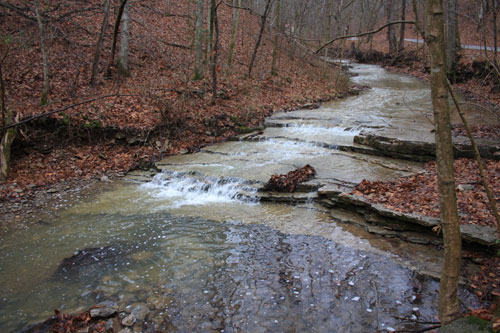
Swift-runningunning Kentucky creek.
(*photo credit)
January 15, 2025 Free or Fair World Trade?
World trade has been a major issue in 2016 political conversations and TPP was objected to by many of the major candidates. Free trade was ceasing to be as acceptable concepts as motherhood and apple pie; free trade seemed to be the buzz word during much of the twentieth century, when the removal of tariffs and duties meant a sure recipe for growth in the global economy. However, when home production was sacrificed for cheaper and less regulated produced goods from overseas the arguments for free trade began to wear thin. Certainly, access to goods from other places is a good goal, provided we do not punish the current workers by loss of jobs with no alternatives in mind. Destruction of entire American manufacturing communities has occurred in the past two decades, when seven million jobs disappeared partly due to changing practices.
Essential conditions of co-equal trading parties are not always met for authentic and just free trade conditions. Pope Paul VI cautioned decades ago that unequal trading partners may not be equally free to negotiate together; the weaker ones would be at the mercy of those with more power. The establishment of equality comes first, or else the free interactions will be a mere sham. How could the poor farmers in a small country compete in any meaningful manner with a multinational corporation with immense holdings, and attempt to dictate conditions for the "free market"?
The World Trade Organization WTO) is caught in the middle of this gross inequality. Spokespersons from the developing countries such as Guatemalan Nobel Peace Prize winner Rigoberta Menchu called for fair trade and a proper climate for international agreements and negotiations. At various WTO meetings in this century, demonstrators have appeared and expressed their misgivings about some of these international trade agreements; these often favor richer nations with their ability to dictate terms to poorer ones. Skepticism has led to open revolt; original free trade advocates say on second thought, "Hold a moment; are the conditions fair; this is especially so when wealthier nations can subsidize commodities such as cotton that are being traded in competition with unsubsidized cotton from poorer African nations? The same pattern applies to grain and food staples as well.
Fair global trade calls for a new look in the light of multinational corporations and subsidies. Many Americans drink coffee and are even willing to pay high prices for it at Starbucks. Yet we know that fluctuating coffee bean prices hurt small growers who work long hours and hardly have enough return to buy bread for their families. Besides advocating herbal drink substitutes, we acknowledge coffee drinking and help promote cooperative systems where small farmers can obtain a living wage with a minimum price for their beans. Thus we affirm truly fair world trade, not trade that benefits corporate profit-makers.
Threats to American Democracy
In 2018, 44 U.S. ex-senators wrote a joint op-ed in which they warned against the possibility of our democracy being eroded; they urged the U.S. Senate to reaffirm safeguards for what our country has held sacred since its founding. We should consider these threats to our nation and world as directly connected to the need to focus attention on climate change and our American participation in the 2015 Paris Accord, which was immediately cancelled once again by President Trump.
Beware of a Crime Against Humanity. If this nation's failure to address the world community's climate change curbing crisis continues, in twelve years time will be exhausted for preventing a major catastrophe (a three degree Celsius global temperature rise by 2100). Failure to act by our citizenry and their elected representatives in collaboration with concerned citizens in other lands will damage if not destroy our inherited democratic values. Yes, we can still act and apply pressure. The Administration must change its ways rapidly and allow the weight of our U.S. participation to influence the global picture and stop the damaging climate change denial by Big Energy.
Do not tolerate billionaire influence. Most people fail to recognize the four nations ("the axis of evil") which opposed supporting scientific evidence for dealing with climate change at the December meeting in Katowice, Poland (COP24). The four are the U.S., Russia, Saudi Arabia and Kuwait. These four had two things in common: they are massive petroleum producers and they have the greatest economic inequality among nations. Tolerance of this inequality among the ruling structures in these countries allow the climate change deniers to soften national policies in addressing this global issue. Our democracy erodes before our eyes when these profiteers get away with murder. They prolong the existing fossil fuel economy and their own perks, tax benefits and havens and fuel subsidies through autocratic leadership and intimidated legislative bodies. To allow this situation to continue unchallenged is to commit possible national and global suicide.
Tax reform is delayed. The two legislative branches of our Federal government are not now in a cooperative mood. This leads to paralysis on tax matters at a time when overspending and need for constantly raising the deficient limits lead to a partial government shutdown. During a period of low unemployment and robust economy growth indebtedness of nearly a trillion dollars a year is utterly unsustainable and this threatens our democratic process. The solution is to promote fair taxes to where the wealthy pay their share and begin projects such as infrastructure maintenance and improvement in transportation, electric grid expansion and subsidies to a "Green New Deal" to bring on a renewable energy economy. This is doable if Congress would have the courage to act in a bipartisan manner and promote genuine tax reform, instead of the promised tax cuts for the wealthy.
Voting restrictions and antagonism add to paralysis. At a time when more and more citizens are needed to comment on critical issues, a movement to restrict voting times and places is growing. These restrictions are deliberately imposed in order to discourage minority and lower income voters who may oppose ruling elites. Rather, for a healthy democracy more times and places ought to be available for participating so that a maximum number of eligible voters will exercise their civic duties.
Many citizens are fearful of violent and uncivil confrontation at political meetings with candidates and elected officials; they prefer to stay home rather than become highly disturbed. If less mobile, they may fear the possibility of hostile crowds -- and consider it best to avoid political gatherings where democratic exercise ought to be expressed. This current lack of civility harms the spirit of peaceful assembly and reduces those willing to attend. Ralph Nader's book, To the Ramparts: How Bush and Obama Paved the Way for the Trump Presidency and Why It Isn't Too Late to Reverse Course, calls for citizens to demand their legislators to meet with them and hear their complaints. If this were done in greater numbers, legislators would hear real issues and not constantly be listening to lobbyists as though they represent the voice of the people. One of our senators has never come to our county and spoken directly to the residents; he only offers occasional columns on issues in the local newspaper.
Our failure to follow through. Granted, many concerns flood our waking hours and make us easily prey to "Issue Fatigue." We sometimes think our signature on a petition will be sufficient for a resulting solution, and then find to our surprise that it is one of a list of many petitions -- with hardened climate change deniers still in power. Our insistence here is to stay focused on the big issue with its impending disaster beyond the horizon and with detrimental efforts already being experienced. Let's continue this social media campaign by telling friends, calling and writing letters to urge others to join us in contacting policy-makers who can make a difference. We must continue the fight by overcoming a temptation to turn to allurements to consume our attention.
Intimidation hurts all. Our current challenges cannot be ignored. Failure creates a national depression, which can smother an optimistic atmosphere that says "we can do it." The issues appear too big for us! For the sake of sanity we accept the need for some diversions and hobbies. The breaks are needed to be effective under harsh conditions, for we do aspire to be models for an upcoming generation. Balance is a key word in these times. Not all is doom and gloom; the bright horizon is just around the corner if we help create it. By lightening up we keep the world from sinking into more darkness. The intimidation of those deniers in power for the next few years must be confronted in a forthright manner. Let's resolve to work together to change the global situation to make this a better place for all people -- and do so in a democratic manner with full participation.

A freshly-cut walnut shell, treat for small mammals.
(*photo credit)
January 16, 2025 Promote Religious Freedom
We often take our religious freedom for granted and forget how fragile it is. All freedom can erode over time without vigilant oversight. The early founders of our nation valued freedom highly in their long march to an expanding liberation (through freeing slaves, allowing women to vote and Native Americans to become citizens and welcoming migrants to our shores). The liberation process is still incomplete but is progressing. In no way should the religious beliefs of minorities be sacrificed by overly restrictive state of national regulations. The Bill of Rights guarantees the basic freedom to worship God as one sees fit.
In Kentucky, some religious intolerance has occurred but the memory has faded with time. A political group called Know Nothings rioted in the 1850s and killed Catholics in Louisville through fear of the increasing numbers of German and Irish immigrants at that time. At various times in American history Jewish people have seen their houses of worship smeared with paint and their tombstones desecrated. Small groups of sectarians have been driven out of one town or another and their churches burnt down. In fact, the religious practice of snake handling is forbidden in our and neighboring states for the sake of safety. And now the Moslems are subject to intolerance and possible restrictions on entry.
One could say the basic thrust is towards greater religious tolerance, but that can run into the biases and peer pressures of a secular society. American colonial history included state religions prevailing and some groups not allowed to worship in one or other place. The federal government left religious preferences to the states but not allowing any religious test for public office. A great effort is being made by American secularists and some liberal elements to force hospitals that are sponsored by religious institutions to perform abortions or to engage in practices that they find contrary to their religious beliefs. The ones who desire restriction say that if the hospitals get tax exemptions and subsidies in any manner, they must carry out this or that activity to their secular liking. Is this also intolerance?
The power of the predominant culture to propagandize the general public is very real, and this power is growing with the concentration of media in the hands of fewer and fewer groups. Health institutions are not the only area impeded. Religious restrictions arise in regard to social services, criminal justice, education and most other areas. Do news outlets sometimes designate religious institutions as somewhat unpatriotic for deviating from "acceptable" public standards? Upholding the rights of parents to raise their children as they see best may become more difficult. Here health issues such a vaccination can become quite complex because the general public expects all to be protected.

Kentucky hayfield after dusting of snow.
(*photo credit)
January 17, 2025 The Pluses and Minuses of Wood Heating
Happy Ben Franklin Day! We associate this highly versatile founding father with everything from post offices to hundred dollar bills, from free libraries to the Declaration of Independence, from newspapers to wood heating. Let's talk energy issues in 2025 and in the frigid times we experience right now. Yes, wood is a renewable fuel, just as is solar and wind energy, and to some degree it has been thought of as earth-friendly. However, unlike solar and wind, burning wood adds to the burden of a carbon dioxide laden atmosphere and the resulting climate change we are experiencing. Does wood burning lose it attractive luster?
Wood users feel secure when domestic heating could be threatened with sleet-causing connections to grid electric systems falter and fail. Wood-burning gives a sense of coziness, for home is where the hearth and heart are located. Wood-burning enhances a basic human instinct, that is, to be mesmerized by fire that began when our pre-historic ancestors discovered and controlled this marvelous phenomenon for the first time. The sight of wood smoke curling in the winter valley or the smell of wood smoke has been cherished, but those good sights and smells give rise to more recent signs of air pollution coming from burning organic matter. Fireplaces are terribly inefficient and can be net heat losers taking out more heated air than they produce and only warming some standing right by the fire.
Thanks in part to Franklin, metal inserts have been installed in modern fireplaces where allowed by building regulations. Fireplaces gain in efficiency when they contain built-in air convection ducts. Franklin never received a patent for his stove, for he was convinced that it belonged to all the people. He was ahead of his times in a spirit of a collaborative economy; he was respected for his practical knowledge, wit, and far-sightedness on a host of political, economic and social issues. The iron cast (Franklin) stove or modified open fireplace that bears his name showed the basic concepts of heat transfer at work for us. Is he not the "father of energy conservation?"
Many older wood stoves do not meet federal government emission standards; they are sources of air pollution due to incomplete combustion. They emit wood smoke that gives off harmful carbon monoxide, particulate matter and tars. In the course of time, as new more efficient and certified stoves have become available, especially those built after the mandated date of July 1, 1992, far less polluting wood stoves are now installed. Mandated wood stoves are all fitted with secondary combustion/ (oxidation) surfaces. Some of these are equipped with catalytic combustors, which burn particulate matter and other gases before possible escape. However, catalysts need to be replaced every few years, and they can be poisoned easily by burning materials such as plastics.
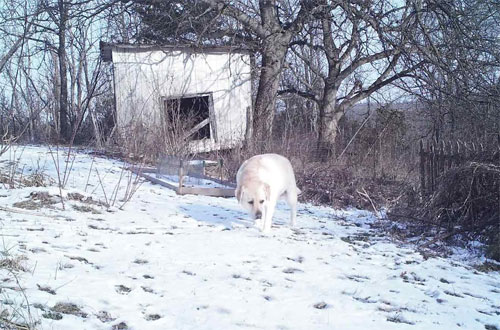
Exploring fresh snowfall with natural camouflage.
(*photo credit)
January 18, 2025 Octave for Christian Unity
Today begins an eight day (octave) period of prayer for unity of all Christians that will end on the feast of St. Paul's Conversion on January 25th. This celebration was started one hundred years ago this month by Rev. Paul Wattson, originally the leader of an Anglican Franciscan community. Today the ministry is carried on by the Franciscan Friars of the Atonement.
The major Christian religious families are all committed to the coming together of the separated churches and groups into a unity of witness and cooperative endeavor. Many followers of Christ regard unity as a public commitment or moral duty; for those of us "ecumenism" must grow, namely, the promoting of worldwide Christian cooperation, understanding, and eventual unity. That is the prayer of Jesus at the Last Supper and is ours as well today. Praying for unity is now becoming mainstream and has resulted in a host of joint endeavors, study and working groups at the theological level and joint social justice programs and support groups. In recent years the formal Catholics/Lutheran theological discussions yielded a joint statement dealing with the faith and works controversy leading up to the Reformation, and Methodists and others have signed on to this statement as well.
Likewise the efforts of the Catholic New East Welfare Association and its prize winning periodical "One" to treat all other Christian groups as working to a single goal (and giving them space for publicity and support) is salutary; their leadership is truly ecumenical.
What about a possible "ecumenism" or further unified action by people concerned about the environment? The difficulty with such unified action is that many "religious" people see no future earthly concern beyond their own mortal life -- for they are heaven bound and even at times despise anything "earthly." These people see Earth only as a stepping stone to heaven and will be consumed by fire at the end. Unfortunately, some "Christians" would like to use the resources up now, since real time for them is only the span of their own lives, and how else to enjoy things but in the present moment? They are like people who pump the Ogallala Aquifer in the High Plains dry because others might use it up first. Today, too many hold an unsustainable lifestyle with no faith in the future.
Ecumenism must include certain basic beliefs in order to work together. We are not to waste the resources God gave us to achieve our purposes in living. All that God creates is good and worthy of our respect. We await and hasten the day of a New Heaven and New Earth, and so should not harm this God-given home in any way. Even the imagery of fire transforming Earth at the end could be a profound change like fire turning rocky ore to shiny metal.

The Kentucky River, Jessamine Co., KY.
(*photo credit)
January 19, 2025 Vocational Call in the Twenty-First Century
I will make you the light of the nations so that my salvation
will reach to the ends of the Earth. (Isaiah 49:6)
In the silence created by a heavy snow fall, when all sounds normally heard are dampened, we strain to hear any sound at all. In winter silence we await a call from God, a call that comes to all of us, not just those young or at important stages in life's journey. We listen to our own personal calls, as different as the many unique snowflakes -- or at least they just might be varied.
When someone seeks a change in occupation a friend may ask: "Are you happy?" Reasons for current unhappiness are many, and so the challenge exists to know the source of discomfort and discern a better ministry or area of work. God's call is to us in this age -- not another. According to one survey Nigerians are regarded as among the happiest people in the world; they trust in God and what God gives them in life. Are you happy? In her final years my mother always said she was "happy, happy." She was content with what God had given her to do and be.
Through baptism all Christians have a priestly, prophetic and kingly role to play, a call to holiness and service. I knew at ordination that things were to be tough and different. My parents did not want a formal first Mass, so I didn't have one; second, at ordination a pigeon spurt on my alb as I was walking into church -- and I took it the Spirit was speaking. The high priestly call that had a sense of "princely" character was so different from what our first American bishop (John Carroll) wanted to be known as "Mr. Bishop," similar to George Washington being called "Mr. President." The suggestion evaporated and within a half century bishops mandated six white horses at time of visitation (never really implemented). Our American priesthood should not be princely.
We gradually become aware that God calls us to let go of the things of the past and to come ever closer to those within the divine family. God is constantly calling. I heard Father Hubbard, the Glacier Priest and scientist, when I was young, and I considered that it would be wonderful to be a geologist/priest. However, Xavier University did not have a geology department, and I ended up majoring in chemistry, but still seeking God in the natural world with all its splendor. We have the changes that make life as it has turned out to be -- and in my case that became the more general public interest scientist that has its own vocational call. Life is a continual listening and, as death lies ahead, I and all await the major call to eternal life.

A view through towering treetops.
(*photo credit)
January 20, 2025 Corporations Exist at the Citizens' Pleasure
After the call during the 2016 political campaign for revolution and radical reform, we can give serious refection to corporate institutional threats to our democracy. Corporate power and wealth and power can certainly erode our democratic values and promote profit-making at all costs including our sensitivity to others. Some corporate CEOs and other officers have been in the forefront of white collar crime that seeps out from the board rooms and suites of business America. But even more remarkable than such revelations is the power of individual corporations in our globalized world, which exceeds that of entire small and moderate sized nations. Where did courts ever conceive of the idea that corporations are persons? A few years back the Program on Corporations, Law and Democracy <www.poclad.org> developed a model legal brief to eliminate corporate rights:
Summary of Argument. "The people of these United States created local, state and federal governments to protect, secure, and preserve the people's inalienable rights, including their rights to life, liberty, and the pursuit of happiness. It is axiomatic that the U.S. people -- the source of all governing authority in this nation -- created governments also to secure the people's inalienable right that the many should govern, not the few. That guarantee -- of a republican form of government -- provides the foundation for securing people's other inalienable rights and vindicates the actions of people and communities seeking to secure those rights.
Corporations are created by state governments through the chartering process. As such, corporations are subordinate, public entities that cannot usurp the authority that the sovereign people have delegated to the three branches of government. Corporations thus lack the authority to deny people's inalienable rights, including their right to a republican form of government, and public officials lack the authority to empower corporations to deny those rights.
Over the past 150 years, the Judiciary has "found" corporations within the people's documents that establish a frame of governance for this nation, including the U.S. Constitution. In doing so, Courts have illegitimately bestowed upon corporations immense constitutional powers of the 14th, 1st, 4th and 5th Amendments, and the expansive powers afforded by the Contracts and Commerce Clauses. Wielding those constitutional rights and freedoms, corporations regularly and illegitimately deny the people their inalienable rights, including their most fundamental right to a republican form of government. Such denials are beyond the authority of the corporation to exercise ...[and] the Courts or any other branches of government to confer."
Such asserted constitutional claims should be dismissed because they deny the people's rights to life and liberty, and their fundamental right to self-governance.

Icicles extending down limestone outcrop.
(*photo credit)
January 21, 2025 Africans: Joys and Sorrows
How can the second largest land mass on Earth (Africa) go overlooked? In part, it is because of its distance from our shores and our constant awareness. Perhaps it is of lower economic importance than our trading partners in Asia and Europe and thus perceived as not needed for our security and well-being. It is not like Europe in being the origin of our more prosperous citizens, nor does it bear the military urgency of the Middle East at this time, nor the economic power and woes of the Far East. Africa has been regarded as the Dark Continent, a place of rain forests and tropical wildlife and the unfortunate people some enslaved before being brought under horrible conditions to the New World. Are African problems so formidable that we look the other way?
We are reminded by TV, jet travel and Internet that we cannot avoid Africa as a part of our human family. The world is too small and so their problems become ours, for we are sisters and brothers. We can't take Africans and their resources for granted, playing one country off against another to obtain the lowest prices, to the detriment of African workers. Besides, health security is a major issue in the Sub-Saharan portion of that continent and especially a host of still unsolved tropical diseases plaguing Africans. The incentive to address some of these concerns is not there when drug companies are inspired by profit-making major maladies.
As we celebrate Martin Luther King's birthday this week, we redouble our efforts to address both African and Afro-American problems. Some would say that a color blindness is in order and that keeping racial statistics is outdated. Let's look a little deeper: Blacks lives do matter; Head-Start cutbacks have affected Afro-Americans more than other groups; cutting non-violent prison populations will be welcome in communities of color. Affirmative action programs, which are needed to correct the accumulated injustices of hundreds of years, are being challenged and discarded by people who think they have unfairly been left out due to being white. True, Afro-Americans have made economic and political strides, but education- and health-wise much more has to be done. A higher proportion of blacks have diabetes, AIDS and heart disease. On average, black males die a decade earlier than their white counterparts. More Afro-American males between ages 19 and 39 are behind bars than were enslaved from that age group at the start of the Civil War.
Africans and Afro-Americans as communities have been so very gracious and forgiving. Few of us realize that crews on slave ships were often dumped at the ports where the slaves were being sold, and that the slaves in their poor economic condition befriended these abandoned sailors -- testimony to a godly people.
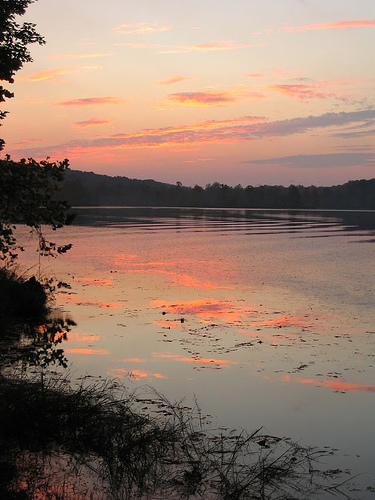
Sunset at Energy Lake, Golden Pond, KY.
(*photo credit)
January 22, 2025 Highlight Tame and Scenic Rivers
In this month when we focus on water, it is an opportunity to consider the beauty of rivers, some of which are frozen at this time, but have hidden life within. For much of the year rivers are living waters that flow clearly and enliven our spirits -- though pollution has turned a number of rivers such as the Yellow River in China and the Ganges River in India into a stream of pollution and sewage down near their mouth. At the sources of both of these rivers the water flows pristine, and yet through the onward movement to the sea the wild and the scenic give way to the tamed and unsightly. However, taming rivers can still honor beauty.
Our Kentucky River is both scenic (with beautiful high banks in parts) and tamed with its series of locks and dams to allow navigation on over half of the river's length. At times of low water flow, such as in drought, pools between each dam are really the equivalent of a series of lakes that hold enough water to permit boats to move from lock to lock. On many American rivers the series of chain lakes/pooled rivers takes much of the "wild" out of the rivers except in times of severe flooding.
Green renewable energy is now in the process of being harnessed at the Kentucky River’s existing dams. The Mother Ann Lee Hydroelectric Station at Lock and Dam 7 is operating by its partner/ operator Lock 7 Hydro Partners; this now uses all three turbines that were idled for a period since its construction nearly eight decades ago. This site is certified as "low-impact," meaning that it obeys the following requirements: proper river flows, water quality, fish passage, watershed protection, preservation of any threatened or endangered species, protection of cultural resources, and public access and recreational opportunities. It is now certified by the Low Impact Hydropower Institute. Kentucky River's locks & dams hold promise to expand the supply of renewables with two more dams harnessed in 2016 and several more in the pipeline this year. On the Ohio River American Municipal Power is adding hydroelectric generators at three existing dams with total annual output to power 100,000 homes. Licenses to build more on the 33 state situated dams involve cumbersome regulation barriers.
Some of the less developed (tamed) American rivers are designated as "wild and scenic", and this formal state or federal declaration protects a river from rampant development. Government protection discourages developers from building on banks, denuding forests and constructing new roads. Guarantees are not absolute, and protectors must always be vigilant against extraordinary pressures from selfish property holders to create their own viewscapes -- the "scenic" building that can blight a river valley. Designated wild river areas afford legal safeguards, which protect threatened and endangered species of flora and fauna in river watersheds. However, future harnessing holds great promise.
Fundamental Change before any "New Deal"
Reports circulated by the "Sun Day Campaign" say that the current U.S. Administration is fooling the public into thinking that carbon dioxide emissions are declining. Truly, they were for a short time after the American peak of 2015, but current efforts at fracking that are utilizing natural gas reserves, along with increasing energy demands have turned these into a +3% increase in CO2 emissions in 2025. Now combine this with foot-dragging by a host of developing nations and the situation instead of improving has become more dire as to a possible year 2100 catastrophe. The curbing of climate change is simply not happening and much is due to this and other country's immense appetite for fossil fuels, even the so-called "clean" natural gas with its own relatively smaller global warming emissions of CO2.
Don't be fooled. Renewables are coming, but not fast enough to compensate for energy increases in air travel, electronic devices use, air conditioning and a growing appetite for electric cars (which need an electricity fueling system). Energy use continues to grow worldwide with ever-shortening time needed to reduce fossil fuels use. Realistically, many say a "Green New Deal" (equivalent to ushering in a renewable energy economy to what building a basic infrastructure was during the 1930s Depression Era) is too slow in coming. Unfortunately, many predict that fossil fuels will be needed as auxiliary energy sources until mid-century without a fundamental change of course in the coming years. The foot-dragging by the U.S. (along with Russia, Saudi Arabia and Kuwait) is proving to be a global disaster.
A Way out! This trend in continued fossil fuel use is disheartening. Things are starting to turn around with over one thousand institutions committed to divestment in the fossil fuel industry and bankruptcy of coal companies becoming more frequent occurrences. The public in general is taking notice of the scientific fact of rising ocean levels and extreme weather conditions. Polls show that up to 80% of people (the majority of every age, educational and racial grouping) believe in the need for new renewable energy sources. Those advocating for this program find it to be a positive platform plank for upcoming elections.
As active citizens in a weakened but still functioning democracy, we can choose a non-violent but dramatic resolution. We can change American energy policy and even the flawed and stubborn Administration, though there is only a receding chance that this can be done by normal political action directed at the federal executive branch. Such a change becomes partly foreign policy which is also the often overlooked purview of Congress, the legislative oversight branch of our government. Before a green infrastructure is launched we need fundamental changes that may have to include fighting back against the current president and praying that his successor will follow common sense and agree to work totally for change with the 200-member community of nations.
Act now! The temptation to regicide has arisen in history, but that is not a democratic process and only betrays a bankruptcy in meaningful political governance. Non-violence is the only viable alternative. The fact is citizens must act as a whole and not expect unusual circumstances such as a voluntary resignation from office. Urgency demands that our country take the necessary steps, especially when Trump has installed ‘conservative’ and anti-environmental candidates to head all the government’s agencies. However, now the net is closing and the demand is for a highly novice House of Representatives to utilize constitutional powers to which they have sworn to uphold.
Fight! The charge of "crimes against humanity" as described by noted economist Jeffrey Sachs is quite serious, for allowing this current inaction to continue places a burden on the U.S. Administration and subsequently on the U.S. House of Representatives and Senate. The urgency was certainly never before so great. For the health of our nation and world this process must be undertaken ASAP. As citizens we must support the work of these august national legislative bodies to the fullest degree possible. Hopefully, the actions being undertaken will persuade President Trump to relinquish this disastrous course.
Will the Senate succeed? Certainly one hopes that Senators will see the need to act in a definitive manner. Many environmentalists see the failure to act on climate change in 2019 as becoming still more serious, since this was meant to be the year of joint global action. Our American participation and funding is most necessary at this time; failure to act is a crime against our descendants. If nothing changes, our prayers are that House and Senate will act.
Encouragement. With some degree of compassion, let's show our support to members of both houses of Congress, expressing a concern that they accomplish their mission. Please go farther; persuade other citizens to make phone calls or emails to their Representative or Senator encouraging them to undertake and complete the task before all of us. Emphasize the need for urgency in this undertaking. There is no guarantee that the White House will actually break with the climate change deniers and allow the U.S. to join the community of nations. They will need encouragement; the actual curbing of Climate change is really more difficult than an autocratic movement -- but both tasks demand our sincere prayers.
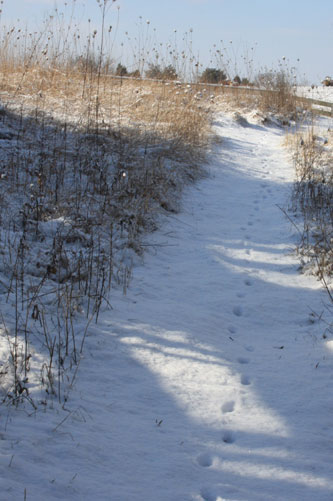
Canine tracks in the snow.
(*photo credit)
January 23, 2025 Legible Handwriting So Others Can Read
Happy Handwriting Day! Few human art expressions are as beautiful as a good flowing script that is being lost today by too much computer work. In my case a shaky hand has lost its ability to transfer information legibly. We marvel at those who take the time to write with an artistic penmanship taught many years ago and now performed with care and pride. Before the age of typewriters and word processors the art of handwriting was highly prized, for it was the medium of written communication, of accounting, and of formal notices; in those day the neater the better. In this age of haste and breathless activity we have come to regard the nearly illegible scribble of the doctor's prescription (several cases fatal consequences due to misreading by pharmacists), as the sign of modern handwriting conducted with speed and dispatch.
Handwriting has suffered from that lack of importance and effort given to manifesting how well one has mastered the pen. In a pre-fountain pen age it required the skill of dipping a straight pen (or feather) into an ink well and writing with only as much fluid at the pen point or the sharpened feather could bear. We forget how much effort it took to write, and that the page was blotted to keep the excess ink from smudging a document. Philip the Second, King of Spain and of more of the rest of the world than almost any other ruler in history, spent a late night session of handwriting when manuscripts to be sent by departing ship to his viceroys were smudged and needed rewriting in his own hand. We've come a long way! However in the process, our handwriting has deteriorated -- and often with perverse pride.
So often, handwriting is legible because someone has taken pains to rewrite a set of notes; thus improving the final draft through corrections and omissions of defects. On the other hand, few of us regard white space as important until we see someone write along the borders and in fine small script; then it becomes a major puzzle to decipher the text, and we postpone rereading it unless absolutely necessary. By rewriting and tightening the text one can ease the pain of reading illegible handwriting. Often we forget that good penmanship was an art practiced with pride prior to the printing press -- and remains a caregiver's gift.
Even before my shaking hand became noticeable a decade ago, I found my own handwriting hard to read. Modern writers tend to make cryptic and abbreviated notes to save time, and thus make life more difficult for a possible reader. Often we write so that we can quickly retrieve if necessary, but some care is a good insurance policy. Maybe having a day to remember and value good penmanship helps. It really gives satisfaction to the writer as well as makes the person appreciated later. Furthermore good penmanship is a treasured work of art to be admired and preserved.

Newly-emerged mushroom after mild January rain.
(*photo credit)
January 24, 2025 The Need to Radically Share
In the immense movement to greater equality among all people, the notion of radical sharing becomes important. We exist in a world in which some use one hundred times or more resources than poor folks in Africa and Asia. Radical sharing means going to the root of things and finding in a deep motivation of love the reason why all have a right to the Earth's commons. Too often when these resources lack accessibility at a given time, those with greater power can utilize far more energy and material products than can those of far less means. We need to share so that all live in a dignified manner, and in some cases this means a process of redistribution, of some giving up and some receiving. The commons means that the resources to the degree available at a given time are not to be possessed or controlled only by the privileged. This especially applies when some lack essentials for a reasonable quality of life including food, lodging and health security.
The authentic root of sharing is love; the tapping of the root is through a process involving the participation of all people of good will. If sharing is to be genuine, no one wants to take advantage over another who is needy. Some may say that giving up their "possessions" will hurt. If, in fact, they are not your own possessions but belong to the commons then "givers" can freely be or be required to be liberated from what does not belong to them. Thus, while painful at first, the liberating act ultimately brings well-being to those of good will. Radical sharing is ultimately a win-win situation, for over- and under-possession are avoided.
In recognizing our individual or group needs, our powerlessness to make essential change on a fragmented level becomes evident. However, through taking control of the situation through community organizing or by freely giving up, the sense of spiritual power can be triggered and enhanced through sharing. Alone we are weak; together by the grace of God we are strong; the greater the togetherness, the greater the strength. With regard to the takers, the ones who seek only individual possession are as much at fault as the one who does not let go. It is better if the affluent freely give up; it is still better if the takers do so in community and not as newly empowered individuals. Furthermore, it is far batter that violence be avoided, especially to people.
God shared and always risks much for us. Jesus was born in a stable subject to hunger and thirst and terrorist threats from a dictator, was a refugee and then grew up in hill country with a different way of talking. Then the establishment plotted against him and ultimately killed him. The risk was immense so that God's power could be revealed. We too join in compassion with the Lord. We too become vulnerable in becoming a little poorer like Jesus when we advocate radical sharing with the needy.

A natural awning (bract) atop tree cavity.
(*photo credit)
January 25, 2025 The Internet: Promise and Peril
This Feast of St. Paul reminds us that he made great use of physical facilities to spread the Good News. Through our access to the Internet and computer we affirm the educational value and the ready and low-cost gift of global informational sharing advantages in the twenty-first century. Manual typewriters and snail mail are things of the past; word processing and email reduces editing time, and allows for information storage and rapid correction and modification of original texts. We are now able to move from paper publishing to a digital mode that is rapid and permits works in progress to be transparent. This use of Internet as a valuable tool cannot be underestimated and are most suitable and appropriate technologies -- but not without associated negative consequences.
Benefits. Information is now becoming instant and accessible and at relatively low cost -- all areas of immense benefits to humankind. Models of computers (personal through "smart phones") have proved to be "last words" that move quickly to planned obsolescence. Generally speaking, the computer age is accessible to those with only an elementary degree of training. Everything from publishing, music sharing and educational methods has been revolutionized. Smart phones have become popular in remote villages in much of the world and the Internet is rapidly becoming a dependable source of information to a hungry world as well as a social means of communication. Repressive governments still have their voice and exercise power though restrictive use of the Internet; however, this network can become a place to sound international alarm, solicit needed political connections, influence open discussion, and threats to oppressive regimes.
Limitations. A few years ago a book, Silicon Snake Oil, discussed a number of problems with excessive computer dependence or misuse. Many notes of caution have proved true; what is appropriate can also become inappropriate through misuse. The fragile nature of sophisticated modern technologies is evident when interconnected; hackers, scams, viruses, and distracting allurements can multiply easily and prey on the vulnerable whether youth or aged or those in between. Internet is public and false turns can be recorded and available to others for years to come. This is a new form of piracy and highway robbery whether it is money or personal information. Complexity brings greater vulnerability.
Safeguards and expensive equipment need to be discovered, installed, maintained and updated. Some regard this as making the personal computer less people-friendly than originally intended. The Internet should remain disconnected when not in use. And speaking of use, the Internet is prone to overuse and almost compulsive and addictive behavior by some who are connected and must remain so at all times. Texting while driving is now a major source of accidents. The watchful and anxious are overbearing and irritated without immediate and instant response.

Snowfall and frozen creek in rural Kentucky.
(*photo credit)
January 26, 2025 An Examination of Conscience
Wellness begins in knowing ourselves for what we are. It is truly personal auditing and should be exercised frequently.
1. Do I love God with my whole heart, soul, mind and strength? Do I talk to God daily in prayer? Do I love my neighbor as myself, and have no unforgiven enemies? Do I remove myself from material idols of every sort? Do I share possessions with those in need?
2. Do I respect the name of God in my speech? Do I object when others use God's name in vain?
3. Do I worship with others on the Lord's Day? Do I rest and relax this one day of the week? Do I refrain from purchasing un-necessary items so others can rest as well on Sunday?
4. Do I honor those in authority? Honor parents, spouse, leaders, bosses, coordinators, church leaders? Do I respect Mother Earth and all her creatures?
5. Do I make an effort not to hurt people through abusive words, quarrels and fighting? Do I abstain from overeating or excessive consumption of drugs or alcohol? Do I strive to be a peace-maker as opposed to creating dissention in the community? Do I confront others who hurt people or animals in any way?
6. Do I show respect for the person of my neighbor in all forms of looking, gesturing and touching? Do I show respect for myself as well in all matters? Do I make an effort not to watch movies, TV or Internet where sex or violence is a major theme?
7. Do I know and show a sense of justice as to what belongs to others? Do I know what is enough and not excessive? Do I see that my excesses and luxuries may even be taken from the resources of future generations? Do I refrain from doing damage to others' property through carelessness or spite?
8. Do I always stand on my word no matter at what cost? Do I remove myself from gossip or idle talk? Do I avoid attending events I do not believe in (weddings, civic events) and thus refrain from bearing false witness? Do I show compassion for weak human beings?
9. Do I overcome the temptation to linger and desire others' looks, shape or other bodily gifts? Do I distance myself from past pleasures that are truly past and should remain that way?
10. Do I overcome the desire for a bigger boat or car, or house or electronic device? Are these not idols, which I could allow to block out my attention to the Lord and service for others.

Colorful blue jay. Estill Co., KY.
(*photo by Sally Ramsdell)
January 27, 2025 Reviewing Cautions Against Gambling
This may be pertinent to the reader or to others who is closely related -- and either could involve engaging in a difficult problem. Gambling may be an "innocent" pastime but the word is in quotes, for all too often it can lead to increasing addictive behavior that happens more often than one cares to speculate. Gambling can become compulsive without adverting to it. One drops a small portion of the weekly paycheck at the service station lottery or the Bingo parlor or the occasional pilgrimages to the Las Vegas near or far. Gambling has that dream of material luck, or the disappointment of failure, or even rarer a pot of gold and many new and hungry friends. Whatever, gambling is a multi-billion dollar enterprise in this country and others as well.
Here are some rules that may help control the urge:
* Don't start, for it is simply a form of materialism that harms our spiritual life and growth;
* If you must place bets on practices or games, horse races, etc., set monetary limits within one's means -- and do not raise them with a special hunch or temptation;
* Keep tight control of the existing situation and when under stress do not gamble at all, for it lacks easy control;
* State reasons for not gambling and profess these openly especially to those who think this is an enjoyable pastime;
* Don't let gambling peers influence you or loved ones, for it is the example of others that launches the practice;
* There is no innocence associated with the compulsion to gamble more and more;
* Confront one's urge to gamble and even more delicately that of others who prefer to say they have the practice under control;
* Try to stop gambling at an early stage before it gets out of hand, and be honest when it tends to do so;
* Don't accept that this reflection has no meaning, for if you do not gamble you most likely know someone who does;
* Muster a no-gambling argument to present to others who are captured by an addictive gambling nature;
* Remind them that only in the rarest cases has someone become wealthy in gambling, and ask whether it is worth the risk?
* Persuade those who are moving into the habit that a far greater and more meaningful "gamble" is to work for the chancy improvement of our political, economic or spiritual conditions -- all worthy of far greater skill than casting monetary bets;
* Refuse to accept that gambling with greater stakes only remains a personal matter, for it can ruin many who have responsibilities to others;
* Know that professional help is available; in our area we refer those with problems to 1-800-GAMBLER or <www.kycpg.org>;
* Discern the matter if already practiced; and
* Don't hide the fact that you are against gambling for material gain. It takes courage to speak out!

Memories of rural Rockcastle Co., KY.
(*photo credit)
January 28, 2025 99 Simple Lifestyle Suggestions
1. Nine fuel use patterns: go renewable energy and battle non-renewables; choose solar applications; promote wind energy; install micro-hydropower; burn wood and biofuels sparingly; explore geothermal potential; turn off air conditioners and use fans; create comfort zones and modular heating; regulate humidity.
2. Nine conservative ways: save water; consider compost toilets; light house efficiently; dry clothes outdoors; make, repair and reuse simple furniture; recycle, maintain and repair buildings; reduce domestic space; use green building design and materials; eliminate unnecessary appliances.
3. Nine land use practices: improve land and introduce edible landscaping; remove invasive species; mulch garden; select native plants; grow organic produce; compost kitchen/yard wastes; extend growing seasons); plant fruit trees; start a wildscape.
4. Nine travel hints: choose efficient vehicles; maintain them well; car-pool; combine trips; drive conservatively; vacation near home; use public means; bike safely; consider a solar electric car.
5. Nine household tips: budget resources wisely and save; use simple household cleaners; keep home chemical free; avoid aerosol sprays; insist on quiet zones; decorate home simply; keep no firearms/hazards; cut hot water costs; maintain houseplants.
6. Nine food ways: support and eat locally grown food; lower salt, refined sugar, fatty foods; make soup, bake bread, create beverages; refrained from processed foods; lower meat consumption; preserve food and use no food additives; harvest wild foods; advocate breast feeding; conserve cooking energy.
7. Nine simple personal habits: get needed rest and sleep; eat and drink moderately; purchase quality fabrics and clothing; use simple personal items; protect from weather extremes; avoid substance abuse and excessive medication; get annual physical, eye and teeth checkups; consider simple funerals; refuse credit cards.
8. Nine forms of green recreation: enjoy participatory sports; hike, walk, bike or jog; acquire a hobby, art or craft; make clothing and decorations; exercise daily in or outdoors; create non-competitive toys and games; camp and backpack; be creative and write or tell stories; read more, watch TV less.
9. Nine personal growth ideas: plan/perform daily personal audits; make annual retreat; fast and pray; worship with others; sing, play and enjoy music; be hospitable to strangers; utilize Internet wisely; teach literacy; visit the sick and bury the dead.
10. Nine civic/community duties: know legislators and candidates and vote wisely; fight environmental pollution; support recycling center and sorting; ban non-returnables and disposable products; lobby for legislation; demand universal health insurance; protect drinking water; demand shared resources and fair taxes; help create work opportunities.
11. Nine wildlife & animal suggestions: develop a sanctuary for birds; keep bees; protect wildlife; use no furs; care for pets; consider aquaculture; observe & celebrate wildlife; control overpopulating deer, wild geese and turkeys; reintroduce bear.

Dried stems of central Kentucky prairie plants.
(*photo credit)
January 29, 2025 Urgency and Reform
Reform your lives! The kingdom of heaven is at hand. (Matthew 4:17)
The imperative to reform our lives sounds to us at first reading like Chicken Little telling us the sky is falling. On deeper reflection we discover an urgency that Christ preached at the beginning of his ministry, and that the urgency is still with us to a great degree today: climate change threats, assault on human rights, upstart politicians and budding leaders, nuclear and rocket rattling, food and health insecurity, privileged misuse of resources, termination of life in womb or deathbed, and terrorist attacks of civilization. Never before in history have a people been capable of and moving to the destruction of the fragile planet itself. Yes, we need Resonance: The Echo of Our Triune God.
Urgency is part of our daily life, and the alertness and prudence that Jesus calls for, is always needed in ways not imagined by our ancestors in the faith. The challenge for us all is to hold faith in Christ, to see that what troubles our relations to the world must not disturb our peace with the Lord. Now that is easier said than achieved, but it makes our frequent sacramental life all the more imperative in these unstable times. We battle a rising secular world that regard religion as old-fashioned and a non-religious indifference as the wave of the future.
What is THE urgency? It is the lack of reform. And who for heaven’s sake wants to preach reform in this age of secular sophistication? Proclaiming a renewable energy economy or self-driving vehicles is not sufficient. Honestly, none of the unreformed affluent will do much more than pause in their onward march to resource privatization. We have a generation of up and coming Chinese, Indian, Russian and Latin Americans who want to equal North American and Europeans in affluent ways. Americans and Europeans ought to lead the way, and yet lifestyle changes is low on their agenda and spiritual courage somewhat hidden. This is a golden opportunity to stand up for moral values and to publicize our motivation via the Internet and social media.
All people, and especially the affluent, must move to self-denial, simple living, and a conservation ethic. These are budding concerns for the upcoming Lenten season. And this cannot be done by paying others to conserve while some continue to jet about the world calling for profound changes -- by others. A distant conference can be handled by teleconferencing and the Internet. We cannot expect others to change their food preferences from resource intensive meat products without being assisted in doing so through eating more fruits, vegetables and whole grains. Reform must be universal and not relegated to a few. Reform will have to contain effective and reasonable regulations, for we cannot expect voluntary choice alone to save our wounded Earth.
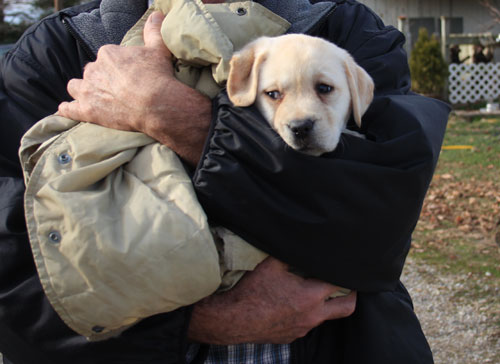
Joys of a new puppy.
(*photo credit)
January 30, 2025 Respect Animals and Especially Pets
Saints like Francis of Assisi remind us to respect animals as companions whether as wildlife or livestock and pets; the former are respected as too their wildness from a distance; the latter are respected when they are up close and in contact with us -- and demanding our provisions and health care.
Pets are a major concern in affluent parts of the world. We cannot overlook the sizeable portion of grocery shelves taken up with playthings, litter, medicines and pet food -- not "feed." Why such extravagance when so many poor people need essentials? Of all attitudes that changed in my ecological journey, dealing with larger pets involved a modification in "99 ways to a Simple Lifestyle" from four decades ago. I accept the need by some for larger pets for wellbeing and security -- but keep domestic cats from attacking birds and wildlife.
Some say God gave us pets because we need them for our own health and well being. Larger pets can be low-cost teachers, can furnish entertainment, be good for psychic health, and prove to be protectors as well. They are totally loyal when others abandon us. Dogs rivet on their friends (let's not say "masters"), listen to them, lick their face when dejected, and protect them to the point of death. They give themselves without reserve. The roles played by sensitive pets are far more than we would imagine at first. Pets grasp human emotional needs; they stay with an injured person until help arrives, or in some cases go get help. Granted, pets have unique personalities, which are also worthy of respect.
Pets seek to endear themselves; they may drag a rotten road kill and lay it on the porch, causing the housekeeper to draw back in horror. "Get that thing out of here." But that is the most precious gift the dog can give his or her beloved. However, a more welcome gift is that of security; the bark alerts us that someone is coming and, provided the pet is not too aggressive. Knowing that the animal is alert and vigilant is a comforting thought, especially when we are campers or travelers. Soldiers in countless wars had their own guard dogs, which alerted them to the approach of the enemy; sheep herders have highly trained sheep dogs, which live with and become part of the herd.
In my youth our family had ole Tex, a dog who wanted to be with us everywhere we went. He generally scouted ahead when we went cross country like the cavalry, the eyes of military marches. Once, during threshing season at a neighbor's farm, the owner wisely locked all the neighbor dogs accompanying the workers in a horse pen. Tex had the agility to climb walls and fences, and out he came while the others remained barking in the pen. We were proud of his ability to overcome obstacles with ease. He was a loyal companion who taught us to be alert and agile.

Reflections at the forest edge.
(*photo credit)
January 31, 2025 Encourage Inspiration
Inspiration can be self-motivated and lead to personal grandeur, or it can be motivated by the Lord and lead to new heights of creativity. Since inspiration is apparently spontaneous, many of us are suspicious when someone is suddenly inspired to do something. Where are social controls? Inspiration is easier to handle when it involves a poem that only the mature will ponder, a novel that is most likely poor fiction, a work of sculpture that will not bite, or a score of music provided it is not too disruptive. Authentic inspiration is often hard to detect and affirm. The fact is -- though we fail to recognize that we are all inspired at different times -- to say something meaningful, to follow a calling, to choose a friend, to say a prayer, to visit someone, or to cook an appetizing dish. Inspiration is part of being human, and winter is a good time to reaffirm its role in our lives whether in new things to do or a colorful room decoration.
Prepare for inspiration. The inspired needed silent space and a listening mood. Part of our freedom is to create an environment in which inspiration will occur. Disorder and chaos are hardly the best times for authentic inspiration -- but the Spirit is not restrained when inspiring the hard-pressed. For most of us, quiet time and space are needed. It is a miracle when God inspires those caught in the noise of the world, but we cannot expect to operate on miracles. The normal procedure is to go to the deserts of our lives, the distant places where all distractions are removed and where the Spirit of God moves and often speaks in whispers. We can create quiet space in our hearts, and this is done by laying bear our souls before God and listening.
Recognize inspiration. Say "yes" to divinely inspired moments of life. Let it be unreserved. We help make the inspiration something radical or deep rooted so that it permeates our entire being. Often our distractions make inspiration take a back seat or be drowned out in allurements and busyness. At least we ought to take notes, give thanks, allow for a future time to act, and make the budding inspiration concrete in some public manner.
Affirm inspiration in others. We often regard inspiration in personal terms as though we alone are affected, but that is not the case. Inspiration has a social quality that must be respected. Others are often cowed and do not admit to inspiration in their lives, regard it with a certain fear, fail to make it public, and through false humility ascribe inspiration to the great persons of science, art, religion, or statesmanship. God has called us to live and act in a privileged time, and we must feel comfortable being here and dealing with our unique inspirations. When our comfort level grows, we can act on inspiration and encourage others to do the same. So often it is this shared recognition that allows the hesitant to act in self-confidence on their inspirations.

